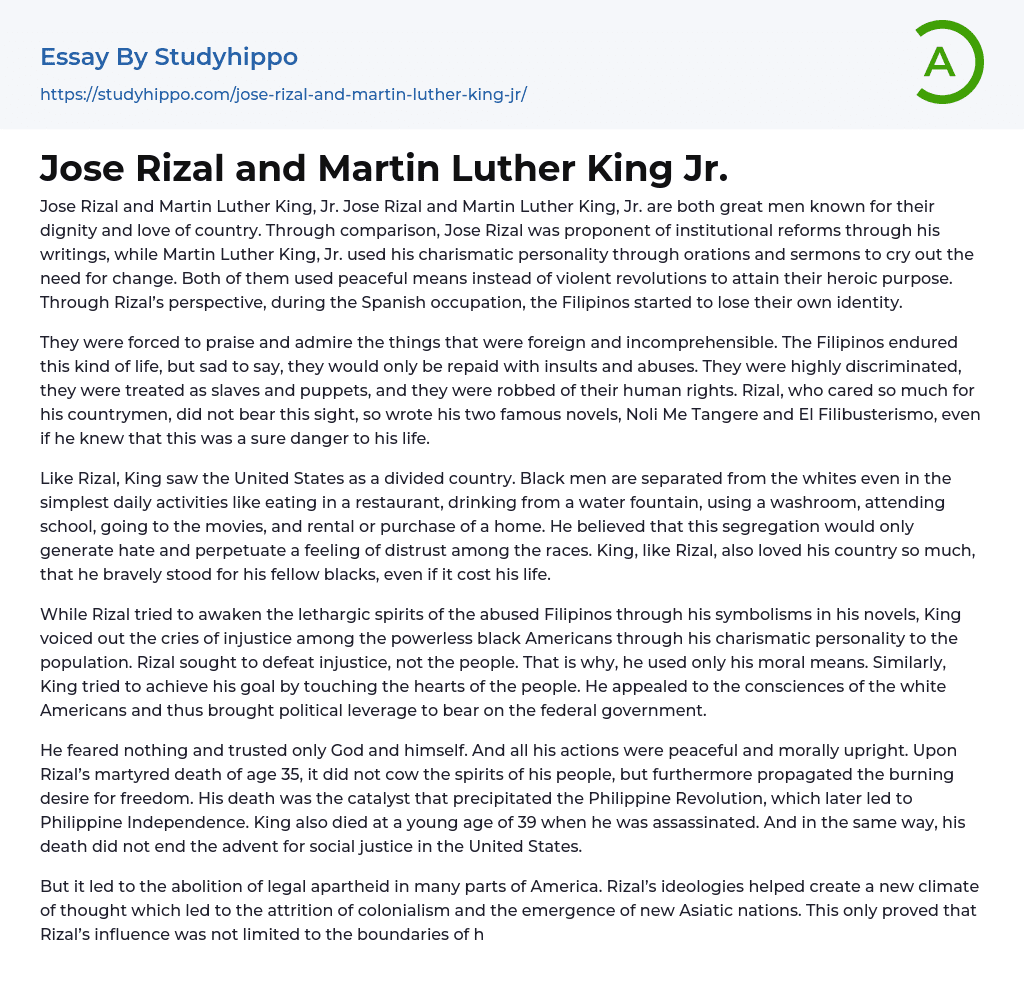Both Jose Rizal and Martin Luther King, Jr. were celebrated figures who showed unwavering commitment to their countries and the embodiment of dignity. Rizal voiced his endorsement for institutional changes through written works, while Martin Luther King, Jr. used his charm to deliver influential speeches and sermons that stressed the importance of change. Impressively, both men peacefully pursued their heroic goals instead of turning to violent rebellions. Rizal strongly believed that under Spanish occupation, Filipinos had progressively lost their distinct identity.
The Filipinos were forced to demonstrate gratitude and reverence for things that they did not understand or comprehend. Despite enduring this way of life, they received nothing but disrespect and abuse in return. They faced extreme discrimination, being treated as servants and pawns, while their fundamental rights were stripped away from
...them. Rizal, who had a strong concern for his fellow countrymen, could not tolerate witnessing this injustice. As a result, he wrote his two famous novels, Noli Me Tangere and El Filibusterismo, fully aware that doing so endangered his own life.
Similar to Rizal, King perceived the United States as a nation that was divided. The act of segregating black men from white individuals extended to ordinary daily tasks such as dining in restaurants, drinking water from fountains, utilizing restrooms, attending school, going to the cinema, and acquiring or renting homes. This practice of separation was deemed by both Rizal and King to only breed animosity and continue fostering a sense of suspicion between different races. King displayed an unwavering devotion to his country just like Rizal did, fearlessly advocating for the rights of his fellow African Americans even when it endangered his own life.
While
Rizal attempted to awaken the apathetic spirits of mistreated Filipinos by employing symbolism in his novels, King expressed the cries of injustice among the powerless black Americans through his charismatic persona, reaching out to the population. Rizal aimed to overcome injustice, not the people, hence he solely employed moral means. Similarly, King pursued his objective by appealing to the hearts of the people, calling upon the conscience of white Americans and consequently exerting political pressure on the federal government.
Despite Rizal's martyrdom at the age of 35, his people's resolve for freedom was not weakened; rather, it grew stronger. He fearlessly engaged in peaceful and morally upright endeavors, placing his trust in God and himself alone. His demise acted as a catalyst for the Philippine Revolution, ultimately resulting in the independence of the Philippines.
In a comparable fashion, King's assassination at 39 did not halt the quest for social justice in the United States.
Despite leading to the end of legal segregation in certain parts of America, Rizal's convictions played a crucial role in molding a new perspective that facilitated the decline of colonialism and the emergence of new Asian nations. This showcased how Rizal's influence extended beyond his homeland and encompassed Asia and other areas. Similarly, King's influence surpassed borders and inspired individuals across the globe to champion equality and unity.
Both Rizal and King are renowned individuals, serving as inspirations to all cultures globally. They were, and continue to be, highly influential heroes, encountering numerous challenges such as imprisonment and assassination. However, they rose above these obstacles, becoming successful leaders who continue to guide their peers towards a peaceful and constructive path in the struggle for rights
and equality. These reasons alone validate their deservingness of the title "heroes" – heroes who have profoundly impacted the world we live in today.
elib-info
- Values of Life essays
- Ethical dilemma essays
- Normative Ethics essays
- Virtue Ethics essays
- Belief essays
- Deontology essays
- Moral essays
- Virtue essays
- Work Ethic essays
- Barangay essays
- Acceptance essays
- Age Of Enlightenment essays
- Child Observation essays
- Confucianism essays
- Conscience essays
- Critical Reflection essays
- Destiny essays
- Determinism essays
- Empiricism essays
- Environmentalism essays
- Epistemology essays
- Ethics essays
- Ethos essays
- Existence essays
- Existentialism essays
- Fate essays
- Free Will essays
- Functionalism essays
- Future essays
- Good And Evil essays
- Human Nature essays
- Individualism essays
- Meaning Of Life essays
- Metaphysics essays
- Natural Law essays
- Personal Philosophy essays
- Philosophers essays
- Philosophy Of Life essays
- Political Philosophy essays
- Pragmatism essays
- Reality essays
- Relativism essays
- Teaching Philosophy essays
- Time essays
- Transcendentalism essays
- Truth essays
- Utilitarianism essays
- Antisemitism essays
- Black History Month essays
- Black Lives Matter essays




